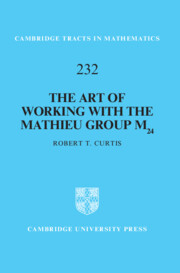Book contents
- Frontmatter
- Dedication
- Contents
- Figures
- Tables
- Preface
- Acknowledgements
- 1 Introduction
- 2 Steiner Systems
- 3 The Miracle Octad Generator
- 4 The Binary Golay Code
- 5 Uniqueness of the Steiner System S(5, 8, 24) and the Group M24
- 6 The Hexacode
- 7 Elements of the Mathieu Group M24
- 8 The Maximal Subgroups of M24
- 9 The Mathieu Group M24
- 10 The Leech Lattice M24
- 11 The Conway Group ·O
- 12 Permutation Actions of M24
- 13 Natural Generators of the Mathieu Groups
- 14 Symmetric Generation Using M24
- 15 The Thompson Chain of Subgroups of Co1
- Appendix MAGMA Code for 7★36 : A9 ↦ Co1
- References
- Index
11 - The Conway Group ·O
Published online by Cambridge University Press: 31 October 2024
- Frontmatter
- Dedication
- Contents
- Figures
- Tables
- Preface
- Acknowledgements
- 1 Introduction
- 2 Steiner Systems
- 3 The Miracle Octad Generator
- 4 The Binary Golay Code
- 5 Uniqueness of the Steiner System S(5, 8, 24) and the Group M24
- 6 The Hexacode
- 7 Elements of the Mathieu Group M24
- 8 The Maximal Subgroups of M24
- 9 The Mathieu Group M24
- 10 The Leech Lattice M24
- 11 The Conway Group ·O
- 12 Permutation Actions of M24
- 13 Natural Generators of the Mathieu Groups
- 14 Symmetric Generation Using M24
- 15 The Thompson Chain of Subgroups of Co1
- Appendix MAGMA Code for 7★36 : A9 ↦ Co1
- References
- Index
Summary
The Conway group ·O is defined to be the group of all symmetries of Λ fixing the origin. The manner in which Λ has been constructed ensures that it is preserved by all permutations of M24 and all sign changes on a C; we now introduce the Conway element ξT that is not in the aforementioned group of shape 212 : M24 and which we can show preserves Λ. We use ξT to prove transitivity on type 2 vectors, type 3 vectors and crosses, and are then able to work out the order of ·O. This construction is now repeated using the algebra package Magma and a full explanation of the computation is included. An important Remark explains how every element of ·O corresponds in a certain sense to one of the crosses. The stabilizers of a type 2 vector and of a type 3 vector are the Conway groups Co2 and Co3, respectively. Each of these sporadic groups is described in some detail, both manually and computationally using Magma. The Classification of Finite Simple Groups (CFSG) states that any finite simple group is either a member of one of the known infinite families or it is one of 26 sporadic groups. We give a brief description of these groups and how they were discovered, and refer the reader to more complete expositions. We conclude by mentioning the remarkable observation made by John McKay that relates the modular function j to the degrees of irreducible representations of the Monster group M. Conway referred to this tantalizing connection with number theory as Monstrous Moonshine.
- Type
- Chapter
- Information
- The Art of Working with the Mathieu Group M24 , pp. 131 - 164Publisher: Cambridge University PressPrint publication year: 2024

